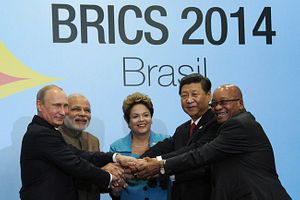There is no question that China is the linchpin in BRICS. Now the founding of the New Development Bank (NDB) and the Contingent Reserve Arrangement (CRA) suggest that BRICS can be looked to for bold moves in the future, with China leading the charge. All sides agree that this is a mutual partnership with noble goals of reciprocal investment and development, but it’s hard to ignore China’s considerable muscle.
China is providing the lion’s share of the CRA, with a whopping $41 billion promise of foreign reserves — with South Africa putting in $5 billion and India, Russia and Brazil putting in $18 billion a piece. The total size of this “virtual” fund comes in at $100 billion, with China holding more than any two other nations put together. As for the NDB, which is due to open shop in two years, there was some argument over where the bank would be headquartered, a fight China won — with India being given the first presidency, Russia chairing the Board of Governors, Brazil chairing the Board of Directors, and South Africa hosting the Africa Regional Center.
South Africa’s finance minister Nhlanhla Nene countered the idea that China will dominate the new BRICS bank, saying that, “There is a commitment to strike a balance. We do not foresee any dominance.” In Africa, no doubt, the BRICS have the potential to do a tremendous amount of good and will certainly accept the clout that comes with taking international responsibility for developing nations. India might be the only BRICS country to be able to counter China’s power, but despite the presidency, India will always play second fiddle to China in BRICS due in no small part in all the other nations’ reliance on China for trade and natural resources.
While the establishment of the CRA and NDB is hardly a bad thing, already the Chinese propaganda wings are in full victim mode, and, of course, Chinese news outlets can never resist the temptation to indulge in condemnation of and conspiracy theories about the West. Basically, look at any op-ed or article on the Global Times — China’s premier propaganda tabloid — concerning BRICS and Ctrl+F for the word “Western.” China is currently painting the picture that a Western conspiracy (or bias) is trying to “drive a wedge” between the BRICS nations to put a stop to Chinese hegemony. One states, “Western opinions show both anxiety and disdain over the cooperation among BRICS countries,” and another outright says, “Western elites have expressed opinions on emerging countries with a biased mentality, which makes their views detached from reality.” Yet another states, “Some Westerners eagerly look forward to seeing problems emerge from the bank.”
This is part and parcel for the state-run media — the Chinese press is either encouraging the media to pay attention to BRICS or condemning them for paying the wrong kind of attention to BRICS. However, it brings up one of the most interesting questions about the association: is being a “developing” country and having strong Chinese ties enough? As it was put so succinctly by The Economist earlier this week, “Other than being big and developing… the BRICS have little in common. The Chinese economy is 28 times the size of South Africa’s… Income per person in India is one-tenth that in Russia. True, all lack infrastructure but lively democracies (Brazil, India, South Africa) go about erecting it differently to authoritarian regimes (Russia, China).” Indeed, the main thing holding the BRICS countries together is their economic and natural resource relationships with China.
If, indeed, the NDB and CRA are a ploy for more dominance in the world of international economic investment in development, the IMF and World Bank have no one to blame but themselves. Inability to enact quota reforms and domination by developed nations have left countries like Brazil, India and China disappointed and frustrated. Whether cornered by ineffective policies that favor developed nations or hellbent on creating a new world order, BRICS could be making some bolder moves in the future, and China is at the wheel.

































